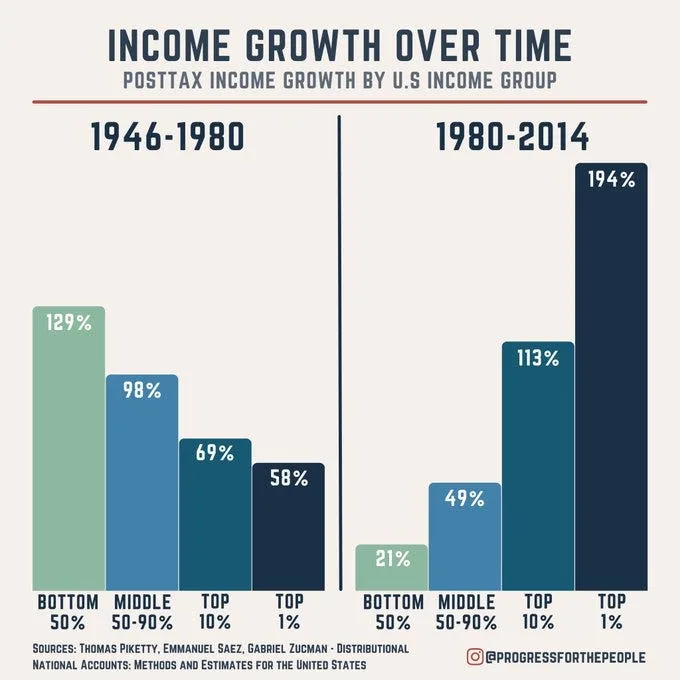Republished with permission from Thom Hartmann
Neoliberalism broke the world, but the neoliberals at the height of political and corporate power don’t want to admit it and so helplessly complain about the backlash to it that they call populism. The easy solution is to end neoliberal policies and return to democracy and its associated classic American values.
But how?
The groupies and oligarchs at the annual Davos “Billionaire’s Woodstock” are confused and frightened. More than 50 countries around the world are facing elections this year, and rightwing populists aligning themselves with Putin and against democracy are on the rise. Particularly here in America.
As Nahal Toosi writes for Politico:
“But years into the transnational struggle with resurgent populism, the corporate leaders in Davos appear to have no serious solutions.
“In conversation after conversation here, I detected resignation and helplessness among business executives when it came to their counterparts in government.”
There’s always a tension between oligarchs and voters in a democracy.
Early Greek democracies passed sumptuary laws against extravagant displays of wealth and used the secret ballot to try to limit the power of their oligarchs. Modern democracies use income, wealth, and inheritance taxes to constrain their oligarchs, as well as limits on dark money in elections.
America has experienced three brushes with oligarchy: when the oligarchs of the South rose up to end democracy here, leading to the Civil War; when the anti-trust laws were put into place and enforced during the Gilded Age around the turn of the 20th century (1890-1920); and the neoliberal Reaganomics era which began in 1981 and is still with us.
We fought back America’s oligarchs twice; will we succeed this third time with an actual oligarch (Trump) running for president as a neofascist populist?
The Davos crowd and America’s corporate media are troubled by the rise in populism because they thought the neoliberalism promoted by Thatcher and Reagan would bring greater prosperity; in fact, it has grown economies but pretty much only in ways that have benefited the oligarchs themselves.
Republican voters are confused about their own populist movement and its leader (Trump) because they don’t realize that in 1981 Reagan and the GOP—followed by Clinton and Democrats in 1992—actually changed the foundational assumptions of the American economy and political system.
We went from Keynesian economics to Reagan’s neoliberal trickle-down system. We went from high taxation on the morbidly rich to billionaires now paying less in income taxes than people who work at MacDonald’s. We went from being the world’s largest manufacturer to shipping our jobs to China. We went from limiting and regulating money in politics to five corrupt Republicans on the Supreme Court throwing the door wide open with Citizens United.
That change was massive and consequential, but it’s never discussed in the media because virtually 100% of its benefits have gone to the country’s oligarchic institutions (giant corporations), which include the small handful of massive corporations and billionaires who own well over 90 percent of our media.
Before the 1980s neoliberal “Reagan Revolution,” our economy was set up to primarily benefit small business and the middle class.
We enforced anti-trust laws so aggressively that when Buster Brown and Kinney shoe companies wanted to merge in the 1960s the Supreme Court blocked the merger because the combined company would control about 5 percent of the US shoe market. Nike alone today controls around 20 percent of that market.
Small- and medium-sized companies built America and brought us the American middle class, the first and largest middle class in the history of the world. But in 1983, when Reagan ordered the DOJ, FTC, and SEC to stop enforcing anti-trust laws dating back to the Sherman Act of 1890, giant corporations began a relentless campaign to destroy locally-owned companies.
Strip malls and small-town downtowns that were once mostly home to local retailers are now dominated by giant monopolistic national chains. Big Box stores, spreading across the country unconstrained since Reagan, have wiped out small towns and rural communities.
For most American small businesses and the communities they serve, Republican governance has been a disaster since the Reagan 1980s.
One study found, as Reuters reported:
“[T]he closer a store was to the Walmart location, the greater the likelihood it would close. Persky and his colleagues found that for every mile closer to the Walmart, 6 percent more stores closed. Close in around the store’s location, between 35 and 60 percent of stores closed.”
Because of strong protections for unions put into law in 1935 by FDR, wages for working class people grew faster than the income of the morbidly rich right up until Reagan took charge and changed the rules of the game.
As a result, working class Americans largely trusted our government institutions; after all, before Reagan took charge people were getting what they wanted from Congress.
However, since Reagan flipped our economy upside down—from the classic Adam Smith “demand side” economics to Reagan’s bizarre neoliberal con of “supply side” economics—over $50 trillion has flowed from the pockets and homes of working people into the top 1 percent’s money bins.
Basically the only beneficiaries have been the billionaires who show up to preen and speak at Davos.
Massive New York hedge funds and banks have been buying up residential real estate ever since the Bush Crash of 2008, converting single-family homes into rentals and driving up the cost of housing from coast to coast. As a result, homelessness has exploded.
Forty years of neoliberal Reaganomics policies have gutted America’s middle class, cutting it from almost two-thirds of us down to less than half. Three American billionaires today own more wealth than the bottom 50 percent of Americans: 166 million people.
Reagan’s policies have made nearly a thousand Americans into billionaires (there were only 13 of them before he came into office and the richest had a mere $6 billion), while impoverishing two full generations of young people.
For example, when my Boomer generation was the same average age as the Millennial generation is today, back in 1990, our generation held 21.3% of the nation’s wealth. Louise and I shared in that wealth; although we were still in our 30s, in 1990 we owned a profitable small business (our fourth) and a nice home in suburban Atlanta.
That was, in fact, the “American dream.” It was normal then, before Republican changes to the economic rules of the nation fully set in so billionaires and giant monopolistic corporations could bleed us all dry.
Millennials today, in contrast, are about the same number of people as Boomers were in 1990 but hold only 4.6% of the nation’s wealth and, if they’re the same age I was in 1990, they’re most likely struggling to own a home, are deeply in debt, and find it nearly impossible to start a small business.
Yes, you read that right. Boomers in their 30s owned 21.3 of the nation’s wealth; Millennials in their 30s today, thanks to 40 years of Reaganomics, own only 4.6% of the nation’s wealth. The rest has gone to the Davos crowd.
And the story for Zoomers is even worse.
As a Kinsey study of Gen Z found, reported by Forbes:
“This cohort is going through what looks like a decline in economic opportunities. Saving for retirement seems out of reach and will become even harder. Almost 60% of Gen-Zers say their basic needs are not being met.”
Similarly, St. Louis Federal Reserve Bank researchers note:
“In the second quarter of 2023, younger Americans owned 70 cents for every $1 of wealth owned by Gen Xers, on average, at the same age.”
As a result, working class Americans are pissed. They know they’ve been screwed, but most couldn’t tell you what neoliberalism or the Reagan Revolution were if their lives depended on it.
As mentioned, you’ll never hear a discussion of this on network television or the nation’s major news outlets because it would implicate the very billionaires and corporations that own the media and who’ve been cheerleaders for Reaganism relentlessly driving the working-class race to the bottom.
So the GOP, having run the Reaganomics/austerity long con for forty-three years now, gives Republican voters an easy answer: it’s “the swamp” that’s keeping them down. And Black people (“diversity hires”). And immigrants. And women.
Most Americans have no idea that President Biden is the first president of either party since Lyndon Johnson to explicitly reject Reagan’s neoliberalism.
Biden has raised taxes on giant corporations (with his 15% minimum tax on profits), strengthened union protections, forgiven billions in student debt, expanded the social safety net, and fought to raise the minimum wage nationwide. He’s successfully bringing manufacturing home from overseas, and is kickstarting a nationwide electric vehicle infrastructure.
And it appears to be working: the economy has survived the shock of inflation (60% caused by corporate greed, according to the Kansas City Fed) and a massive rise in interest rates without falling into recession. More people are employed than ever in history. Unemployment is at lows not seen since the 1960s. Consumer spending is up, as are wages.
But in America and every other country that’s embraced neoliberalism over the past 40 years or so, the impoverishment of the working class and the rise of billionaires’ wealth are driving populist movements. Economically hurting, working people are falling prey to the siren’s song of racism and xenophobia sung by Trump and other rightwing populists around the world.
Stunned by these developments and the failure of their beloved neoliberalism, Jamie Dimon and other billionaires opined last week at Davos about how Trump becoming president “won’t be the end of the world.”
In reality, populist movements like MAGA lead to repressive, oligarchic governments like we see today in Russia, India, and Hungary.
That’s fine for Davos oligarchs like Dimon, as he pointed out, but the loss of democracy usually means even more economic pressure on working class people, who lose all their clout once the oligarchs cement themselves into place with weapons like gerrymandering, voter suppression, seizure of media, and voter purges.
Typically in oligarchies working class people get poorer and poorer over time as they lost their political and economic power: this is exactly what we’ve seen since Reagan. The rich, however, get massively richer (we just learned that the 4 richest men in America saw their wealth more than double over the past four years).
These are the stakes in this year’s elections all over the world, but most consequentially here in America. Reaganomics have succeeded in turning America from a nation of prosperous workers and people who largely got along with each other into an ongoing riot being directed by the most hateful and outspoken voices in the GOP.
President Biden and his Democrats have gone a long way toward slowing and, in some cases, even halting the corrosive impact of Reagan’s neoliberalism, and hopefully will focus over the next 10 months on making this clear to the American electorate.
We’re at a crossroads. We’ll either fall deeper into oligarchy and repression, continuing the cold war Davos’s oligarchs declared on our democratic processes in the 1980s, or we’ll reject Reaganism and continue the Biden administrations’ return to the family- and worker-oriented values championed by FDR and LBJ.
The GOP, completely under the sway of American oligarchs’ dark money, will never abandon neoliberalism; instead, Democrats must continue fighting for working people and the poor with the tools FDR and LBJ proved work so well.
You can help. Pass it along, so friends and family can understand how we got here and the importance of this November!

Thom Hartmann
Thom Hartmann, one of America’s leading public intellectuals and the country’s #1 progressive talk show host, writes fresh content six days a week. The Monday-Friday “Daily Take” articles are free to all, while paid subscribers receive a Saturday summary of the week’s news and, on Sunday, a chapter excerpt from one of his books.

